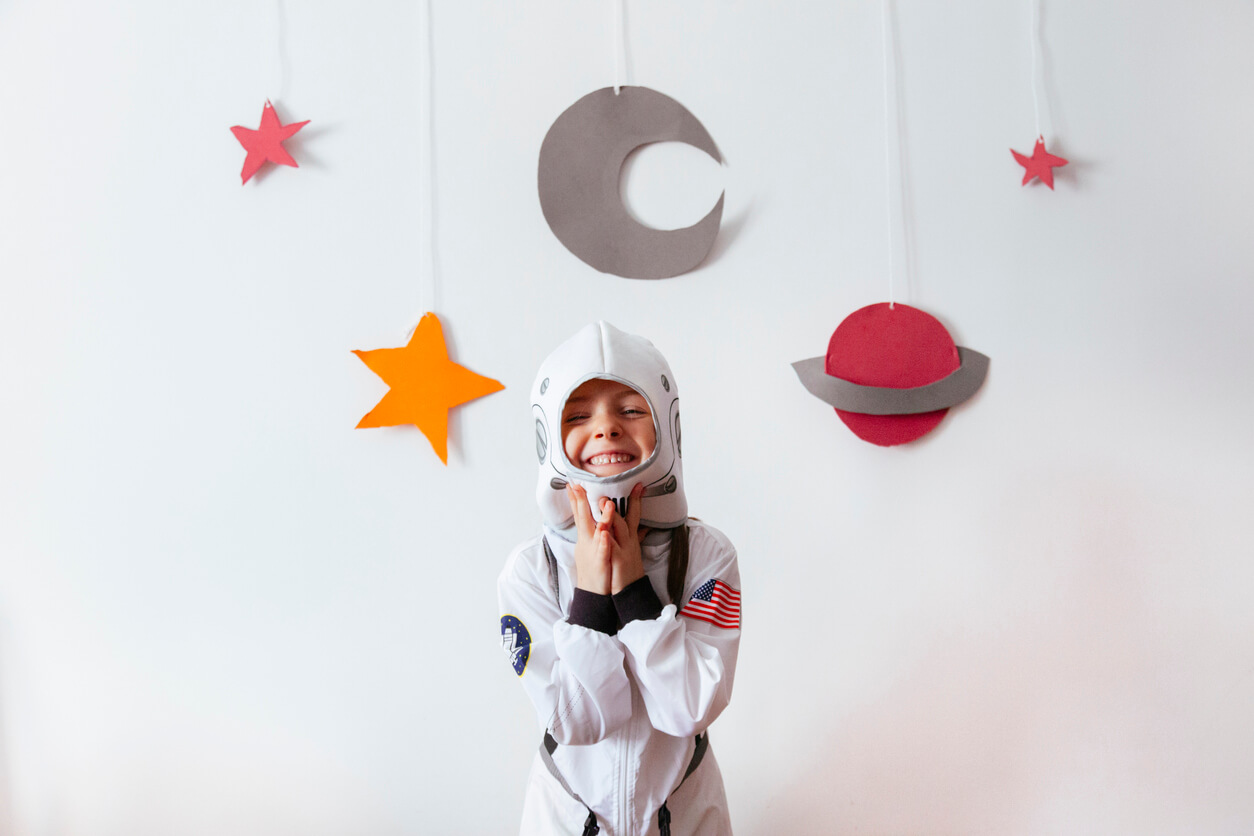Why Is Outer Space so Interesting to Children

The world of outer space is of great interest to many children. Through movies, games, books, and pictures, little ones are introduced to everything about the universe: The solar system, galaxies, stars, and much more.
Also, some of them claim that they’re going to become great astronauts as adults. But what’s so special about this subject that generates so much admiration? Why do so many children have the desire to travel into space?
The fascinating world of outer space
The world here, on planet Earth, is very interesting. Wonderful things happen here, and any day on the mainland can turn into a real adventure. If the symbolic and economic conditions are right, anyone can travel to every point of the globe and enjoy its attractive places. Not to mention the dazzling aquatic world.
But, let’s be honest, the space world has an extra charm: Its inexplicable immensity, its colors in blue and orange tones, its striking brightness, or perhaps its restricted access.
The point is that everything related to outer space provokes great interest in both children and adults. In fact, a 2019 study conducted by the LEGO Group, in conjunction with research firm Harris Poll, claims that 86 % of a group of children aged 8 to 12 are interested in space exploration, while 90 % would like to learn more about the universe. At the same time, being an astronaut is an occupation that many children consider when envisioning their future careers.

Many questions, few certainties
We know that children love to ask questions, at any time and in any place. Curiosity’s expressed in full force between the ages of three and five, the stage we refer to as the why stage.
“The questions and queries posed allow children to relate to and learn about the universe of which they’re a part, thus being an inexhaustible source of learning.”
– Mario Andrés Candelas –
Often, little ones ask us complex questions that take us by surprise, and we’re completely unaware of their scientific answers. Some adults are overwhelmed by being unable to give their children an accurate answer. But this isn’t a problem, as it’s impossible to know everything, nor do our little ones’ questions need to be answered immediately.
What do children ask about outer space?
Some of the most common questions that children ask about outer space are the following:
- Why does the moon follow me?
- Where does the sky end?
- Where does the universe end?
- Why don’t the stars fall?
- Why don’t we fall if the Earth moves?
- Is there life on other planets?
- Do extraterrestrials exist?
While some of these questions have scientific answers, there are others that are difficult to explain. But children insist on repeating those questions over and over again, and we adults aren’t always prepared to answer.

The great beyond is, above all, unknown
Much of the information that we humans have about outer space, we know thanks to NASA, the U.S. space exploration agency. This agency was created in 1958 with the objective of investigating, planning, and directing all aeronautical and space activities of the United States, with the exception of those with military purposes.
Every now and then, we’re surprised by amazing discoveries. But, the truth is that there’s still much to discover, and the feeling of strangeness remains even when there’s a large amount of scientific research carried out.
Mysteries like this produce great curiosity in children. Don’t forget that children love to explore new places, objects, and animals. Therefore, the unknown sparks their interest. For this reason, they include it in their games, in their crafts, and even on the walls of their bedroom.
The world of outer space is of great interest to many children. Through movies, games, books, and pictures, little ones are introduced to everything about the universe: The solar system, galaxies, stars, and much more.
Also, some of them claim that they’re going to become great astronauts as adults. But what’s so special about this subject that generates so much admiration? Why do so many children have the desire to travel into space?
The fascinating world of outer space
The world here, on planet Earth, is very interesting. Wonderful things happen here, and any day on the mainland can turn into a real adventure. If the symbolic and economic conditions are right, anyone can travel to every point of the globe and enjoy its attractive places. Not to mention the dazzling aquatic world.
But, let’s be honest, the space world has an extra charm: Its inexplicable immensity, its colors in blue and orange tones, its striking brightness, or perhaps its restricted access.
The point is that everything related to outer space provokes great interest in both children and adults. In fact, a 2019 study conducted by the LEGO Group, in conjunction with research firm Harris Poll, claims that 86 % of a group of children aged 8 to 12 are interested in space exploration, while 90 % would like to learn more about the universe. At the same time, being an astronaut is an occupation that many children consider when envisioning their future careers.

Many questions, few certainties
We know that children love to ask questions, at any time and in any place. Curiosity’s expressed in full force between the ages of three and five, the stage we refer to as the why stage.
“The questions and queries posed allow children to relate to and learn about the universe of which they’re a part, thus being an inexhaustible source of learning.”
– Mario Andrés Candelas –
Often, little ones ask us complex questions that take us by surprise, and we’re completely unaware of their scientific answers. Some adults are overwhelmed by being unable to give their children an accurate answer. But this isn’t a problem, as it’s impossible to know everything, nor do our little ones’ questions need to be answered immediately.
What do children ask about outer space?
Some of the most common questions that children ask about outer space are the following:
- Why does the moon follow me?
- Where does the sky end?
- Where does the universe end?
- Why don’t the stars fall?
- Why don’t we fall if the Earth moves?
- Is there life on other planets?
- Do extraterrestrials exist?
While some of these questions have scientific answers, there are others that are difficult to explain. But children insist on repeating those questions over and over again, and we adults aren’t always prepared to answer.

The great beyond is, above all, unknown
Much of the information that we humans have about outer space, we know thanks to NASA, the U.S. space exploration agency. This agency was created in 1958 with the objective of investigating, planning, and directing all aeronautical and space activities of the United States, with the exception of those with military purposes.
Every now and then, we’re surprised by amazing discoveries. But, the truth is that there’s still much to discover, and the feeling of strangeness remains even when there’s a large amount of scientific research carried out.
Mysteries like this produce great curiosity in children. Don’t forget that children love to explore new places, objects, and animals. Therefore, the unknown sparks their interest. For this reason, they include it in their games, in their crafts, and even on the walls of their bedroom.
All cited sources were thoroughly reviewed by our team to ensure their quality, reliability, currency, and validity. The bibliography of this article was considered reliable and of academic or scientific accuracy.
- Candelas, M, A. (2011). Sobre las preguntas infantiles y su relevancia para el cambio educativo. Revista de Investigación. Vol. 14 (2011): Escuela Abierta, 14
- Roca Tort, M. (2005). Las preguntas en el proceso de enseñanza aprendizaje de las ciencias. Pla de les Moreres Vilanova del Camí. Didàctica de les Ciències UAB. Educar.
This text is provided for informational purposes only and does not replace consultation with a professional. If in doubt, consult your specialist.








